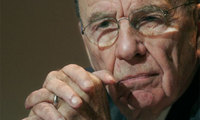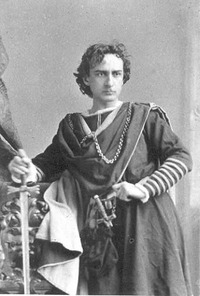
Rupert Murdoch AP Photograph
|
Four months after Rupert Murdoch bought the Wall Street Journal,
the editor quit.
Murdoch already owns the New York Post.
Now he
wants to buy Newsday.
Nevermind that such a purchase would be illegal.
The good money is on Kevin Martin’s FCC letting it happen anyway.
After all, if he doesn’t need a law to enforce,
what’s to stop him not enforcing the laws he’s already got?
Despite
having had no success at preventative or forensic oversight
of the FCC,
Congress is going to give it another go:
However, the looser ownership rules the FCC passed in December – over an outcry from many interest groups – has stirred criticism from many in Congress, suggesting that Murdoch’s Newsday bid faces the first stirrings of a backlash.
The commerce committee in the Senate yesterday approved a “resolution of disapproval” measure that would overturn the new ownership rules, creating more of a hurdle for Murdoch.
Senator Byron Dorgan, the measure’s leading sponsor, said: “We really do literally have five or six major corporations in this country that determine for the most part what Americans see, hear and read every day. I don’t think that’s healthy for our country.”
Dorgan is backed by 25 senators, including Democratic presidential candidates Hillary Clinton and Barack Obama, and is confident it will pass the Senate. A similar bill has been proposed in the House.
—
Murdoch’s Newsday bid faces hurdle,
Elana Schor,
guardian.co.uk,
Friday April 25 2008
We’ll see if the Senate or Democrats have a spine this time.
Meanwhile, the entire mainstream press, except the New York Times,
ignores that
the president of the United States admits he personally authorized war crimes.
Except for ABC, which broke the story, but then couldn’t
be bothered to mention it during a “debate” it hosted between
the remaining Democratic presidential candidates.
If every other major paper in NYC (and 3 out of the top 10 in the U.S.)
is controled by Murdoch,
how long before the NYTimes falls prey, too?
With net neutrality we can still know about stories like this.
Without it?
-jsq






